SimilarWeb vs SemrushUnderstanding your competitors and examining market trends are essential for success in the world of digital marketing. But, given the abundance of data, knowing where to start can be intimidating or difficult. This is when tools like Semrush and SimilarWeb, two of the most well-known and effective platforms for learning about website traffic, SEO, and online marketing, come into the picture. In order to assist you in choosing which tool is best for your company, in this article, we'll compare Semrush as opposed to SimilarWeb's features and capabilities. But, let us first discuss both these tools in brief: 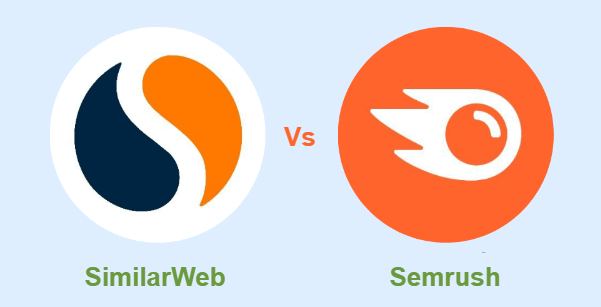
SimilarWeb: What is it?SimilarWeb is primarily a website analytics platform that provides information about audience engagement, demographics, and website traffic. Businesses, SEO experts, and internet marketers may use the information to improve their decision-making and online presence. Businesses can simply track their rivals with its user-friendly interface, keep an eye on industry trends, and optimize their digital marketing tactics. SimilarWeb offers a variety of digital market intelligence solutions in addition to website analytics, such as mobile app market statistics and mobile app store optimization. Businesses may use SimilarWeb to measure the effectiveness of their websites as well as to learn more about increasing their presence online. In addition to websites, it also helps find the target market for mobile apps and how to make the apps more visible in respective app stores. To ensure the quality and dependability of its insights, SimilarWeb gathers its data from a number of sources, including website cookies, on-device data, and direct measurement from websites and applications. All things considered, SimilarWeb is a potent tool for companies trying to increase their internet presence and website traffic. Semrush: What is it?Semrush is a potent SEO tool that assists companies with their search engine optimization efforts and provides in-depth research of target websites. It offers thorough information on a variety of topics, including competition analysis, keyword research, backlinks, organic traffic, and more. Through the use of Semrush, businesses can quickly monitor their progress and make well-informed decisions to enhance their online presence and increase website traffic. Both small and large organizations may benefit from its user-friendly design and adaptable reports. Table of Comparison between SimilarWeb and Semrush
Comparing Semrush andSimilarWeb's Comprehensive CharacteristicsAfter quickly reviewing the differences between both Semrush and SimilarWeb, let's make a more in-depth comparison based on their important features. 1. Keyword ResearchWith Semrush's Keyword Research Tool, you may access a thorough report on any specific term on its dashboard, including all pertinent keyword statistics and keyword analysis. Metrics such as volume, rank difficulty, SERP characteristics, keyword variants, etc., are all available. 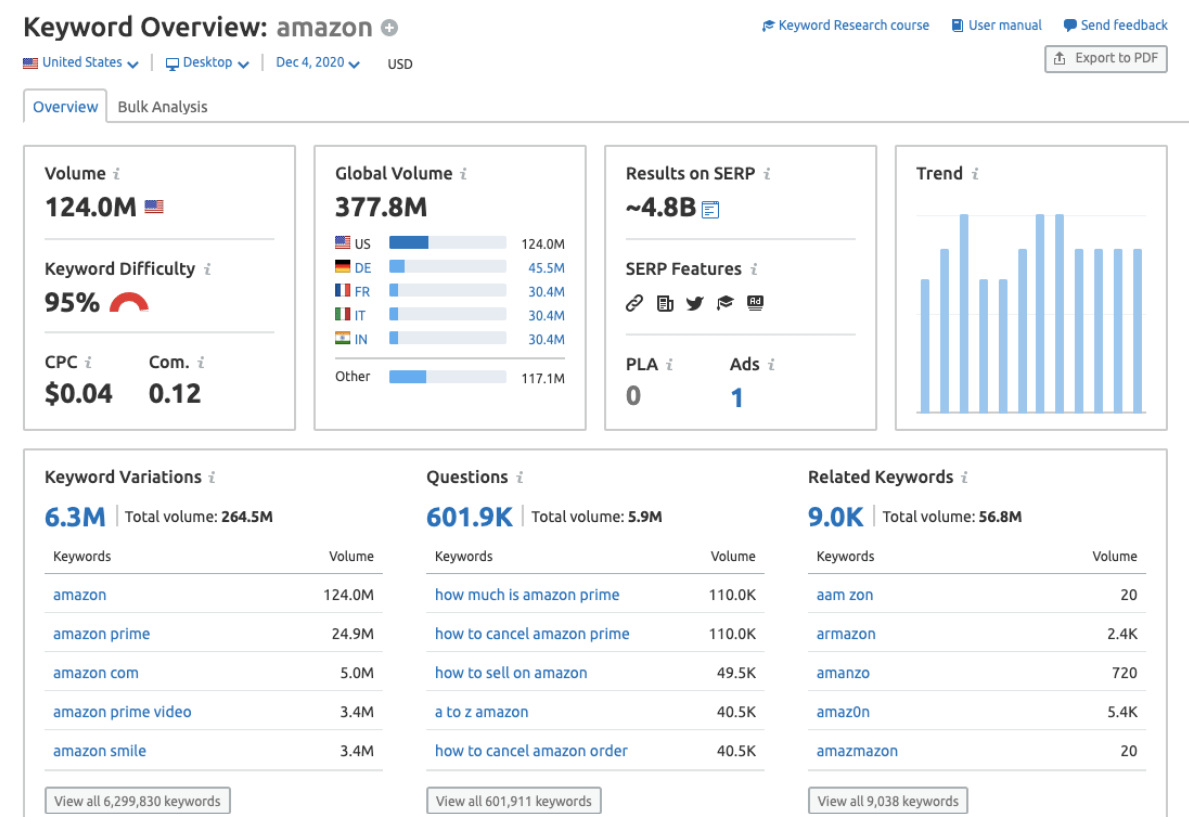
The unique feature of the keyword research tool provided by Semrush is the keyword magic tool. For paid search advertisements, you can get wide match, exact match, and phrase match keywords. You may also just receive a list of all relevant keywords for SEO. 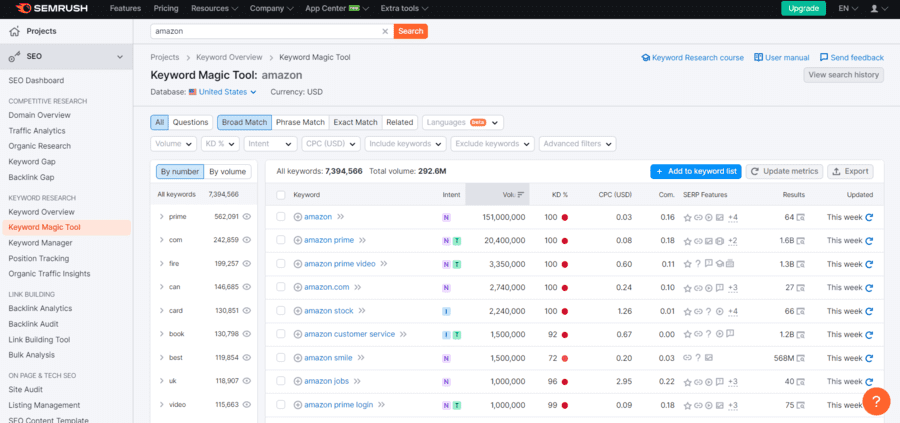
On the contrary, you may utilizeSimilarWeb's robust keyword research tool to identify relevant keywords and categorizethem according to factors like volume, competition, etc. It may also be used to keep an eye on trends and statistics related to search traffic in the market you operate in. 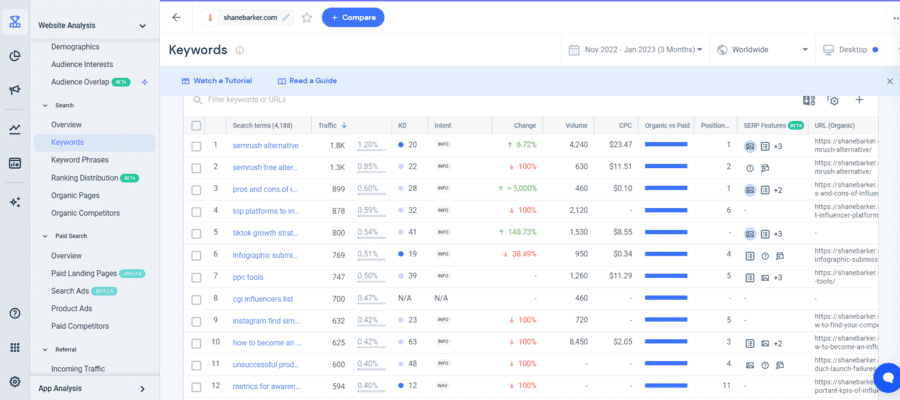
It also offers you the most important information on a single straightforward dashboard, but the information is far less difficult to analyze than Semrush. Search engine, paid/organic search, branded or non-branded, keyword difficulty, and even SERP characteristics are just a few of the options available in the SimilarWeb Keyword tool to help you optimize your keyword research. 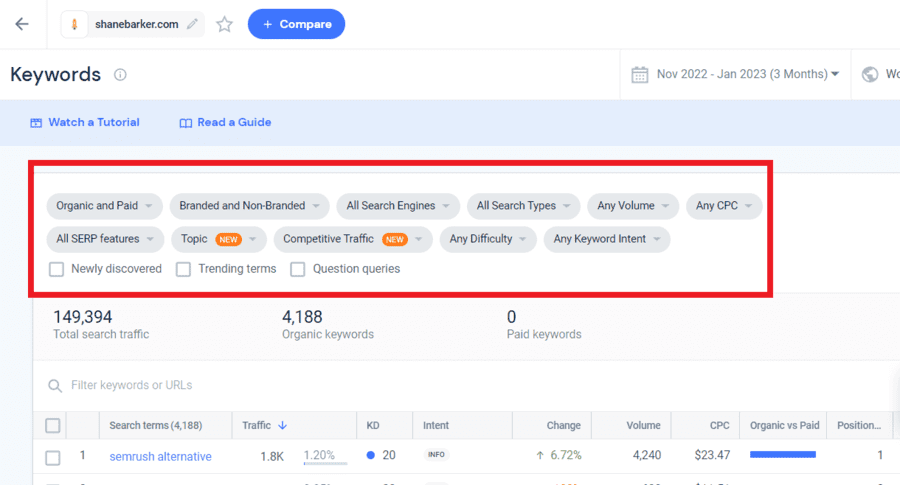
The Keyword Phrase tool lists all the keywords that are used on a website together with their proportion of search traffic. This is an effective way to quickly determine which keywords perform well or poorly. 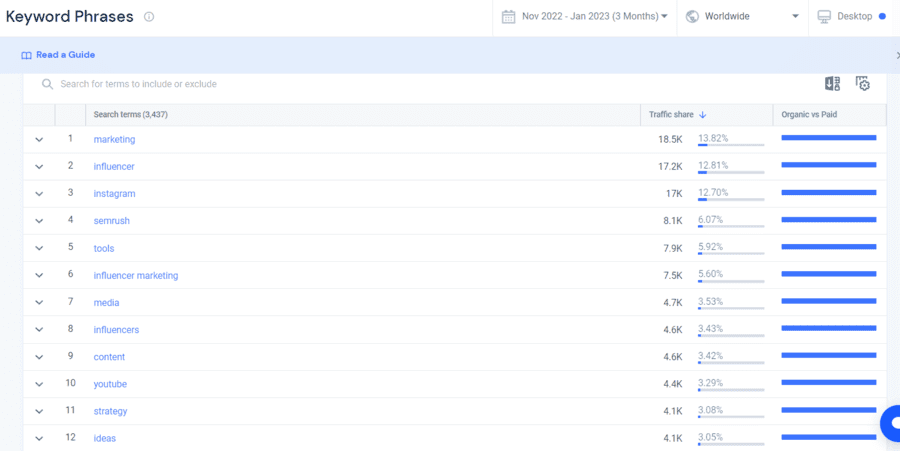
In conclusion,SimilarWeb makes it straightforward and quick to investigate keyword performance and discover new keywords thanks to its general usability and comprehensive, customizedfilter support. However, Semrush offers somewhat more detailed and accurate data. 2. Social Media EvaluationA social media toolbox from Semrush includes many features, including:
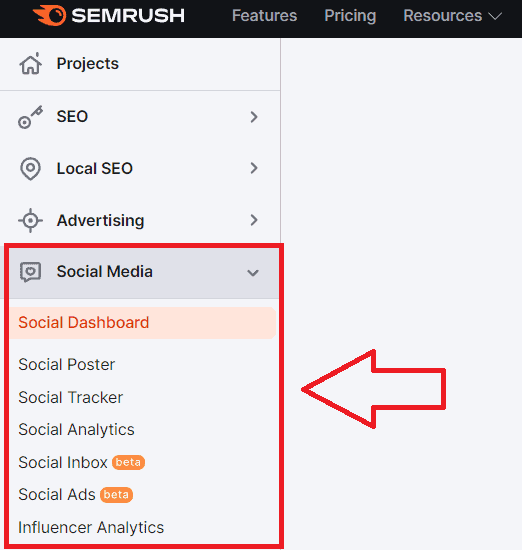
Their social media tracker is a standout feature in their toolbox for social media tracking. It provides a brief summary of all connected social media accounts' activity. Additionally, it can reveal information about how many website visits are anticipated from each social media account. 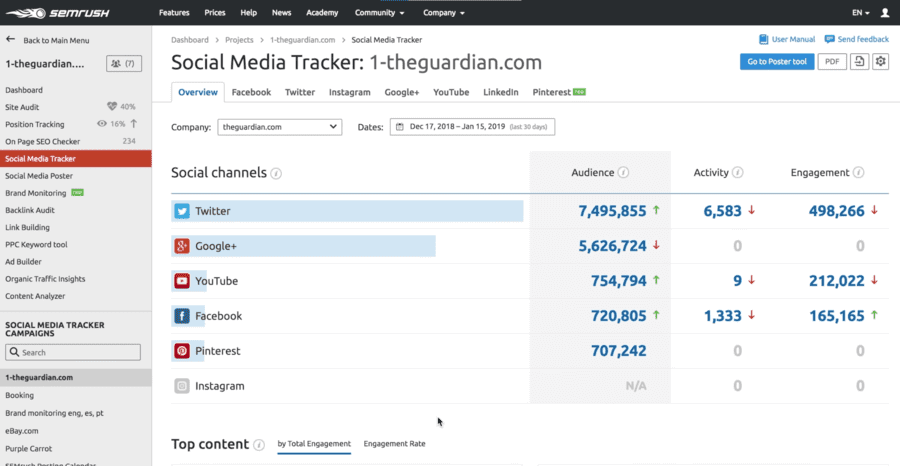
You may also compose posts and schedule them with Semrush, which also functions as a social media content planner. Additionally, Semrush's social media inbox will group all messages and comments into a single handy inbox. 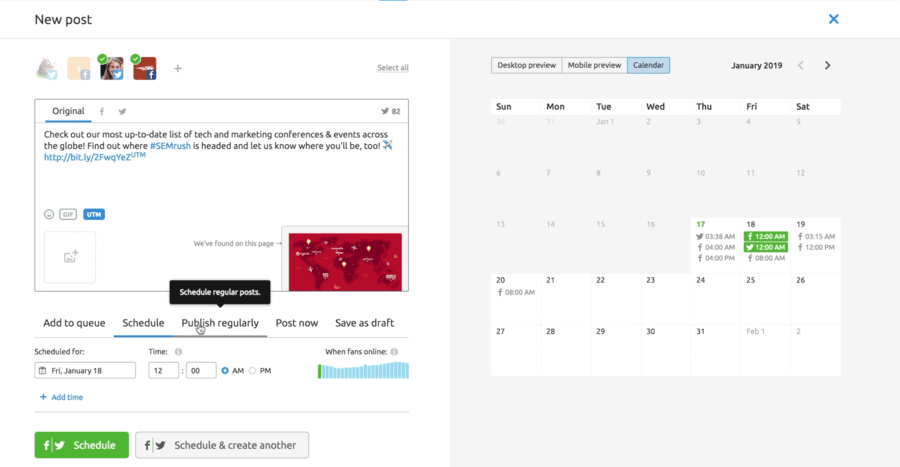
On the other hand, the only thing that SimilarWeb offers is a social media analytics tool. It's a terrific tool to determine how well your social media accounts are performing and how many website visits originate from each social media account, but that is all it can accomplish. We cannot expect more features related to social media tracking and optimization. 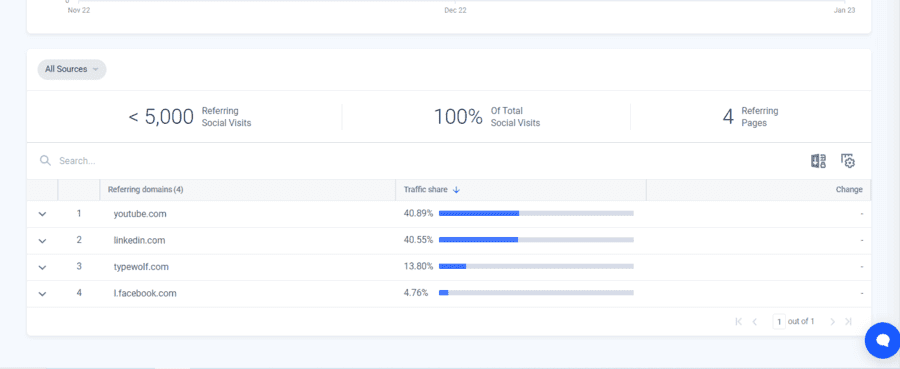
Semrush Social Media Inbox and Content Planner are not included in SimilarWeb Tool's social media overview dashboard; however, this fact illustrates why SimilarWeb is engaging and easy to use. 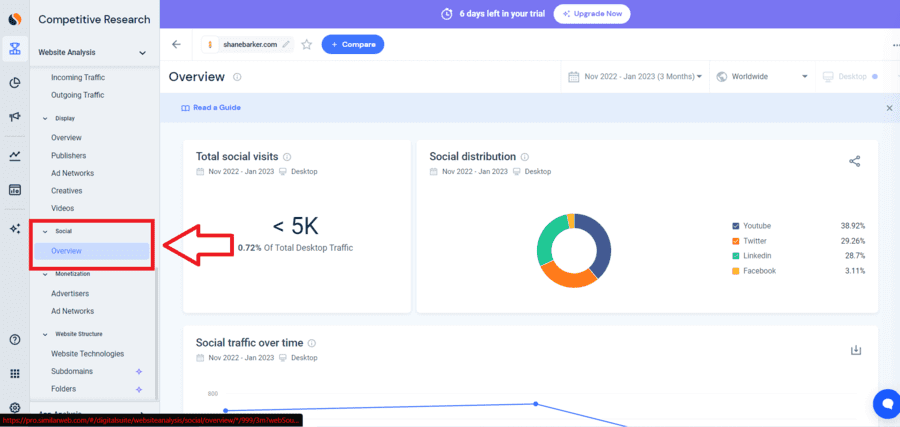
In this way, Semrush is clearly a winner in terms of social media evaluation. It acts as a content marketing tool of sorts, allowing you to manage all of your social media accounts directly from the platform instead of just providing you with social statistics. 3. Analysis of CompetitorWith Semrush, competitor websites are analyzed through a variety of segmented tools, including:
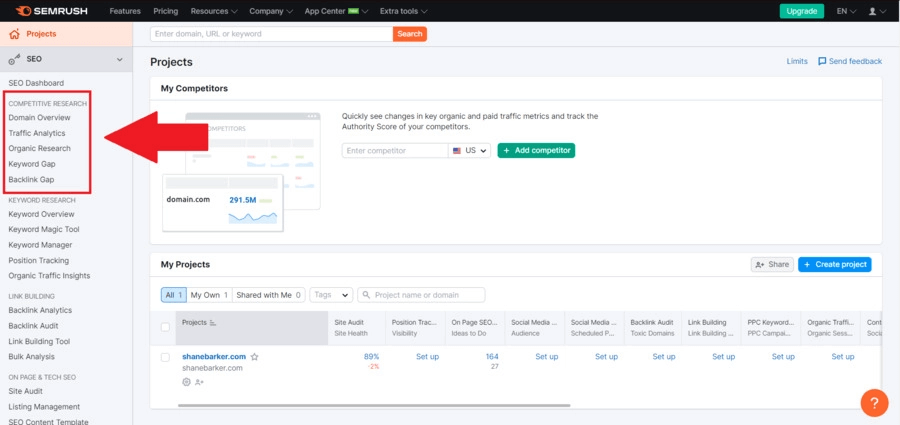
Semrush and SimilarWeb both have this helpful feature called the Keyword Gap tool. Similar data is provided by both Keyword Gap tools, allowing you to examine your competitors' keywords, their search engine rankings, and the opportunities for any keywords you can work on. Below are the images from Semrush and SimilarWeb keyword gap tools, respectively: 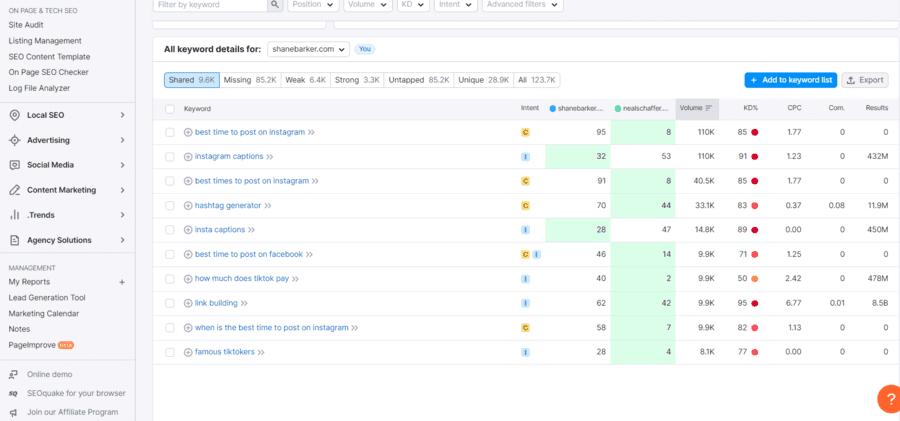
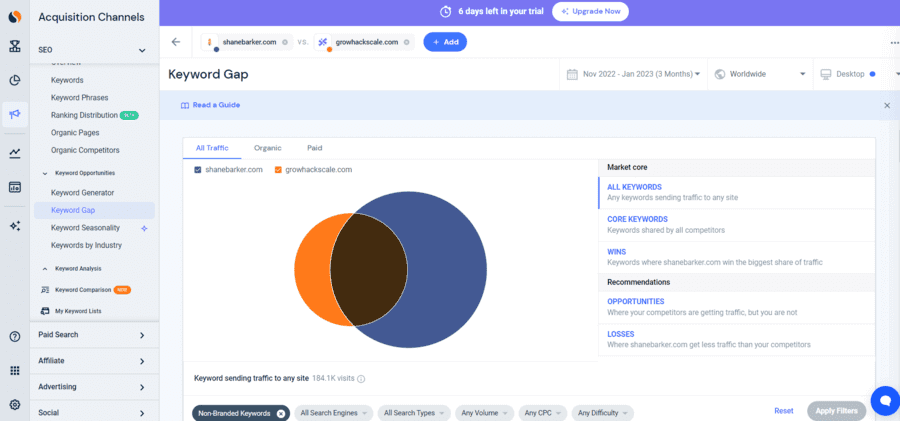
You can easily compare the performance of your keywords to those of your rivals by looking at Semrush's list of keywords along with their volume, KD, and CPC. 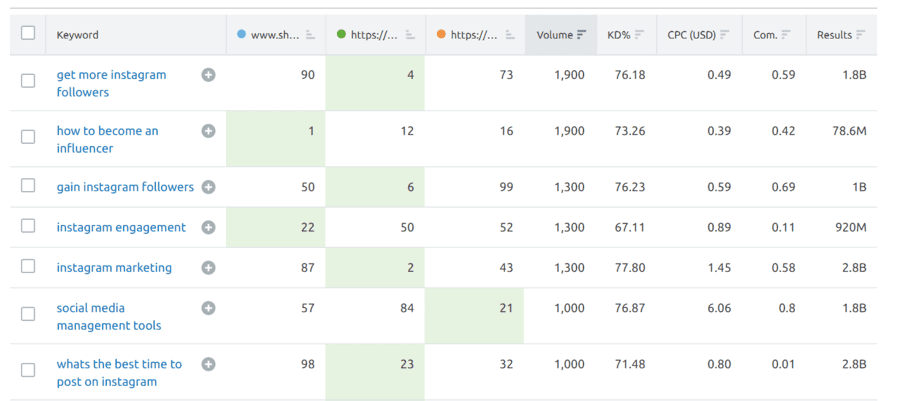
In contrast, SimilarWeb also provides benchmarking and competition analysis tools, just like Semrush. However, it enables you to compare your traffic metrics with those of rivals across a range of channels. All you need to do is go to the "Similar Sites" section, and you'll uncover competitors that have already done some great work. 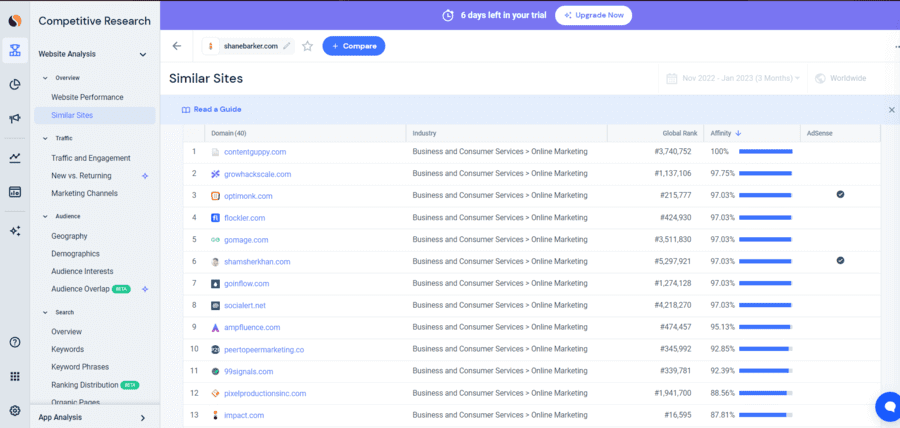
By selecting a specific competitor, you can also utilize this tool to research the techniques of your rivals and find elements you can use in your SEO or content strategy. 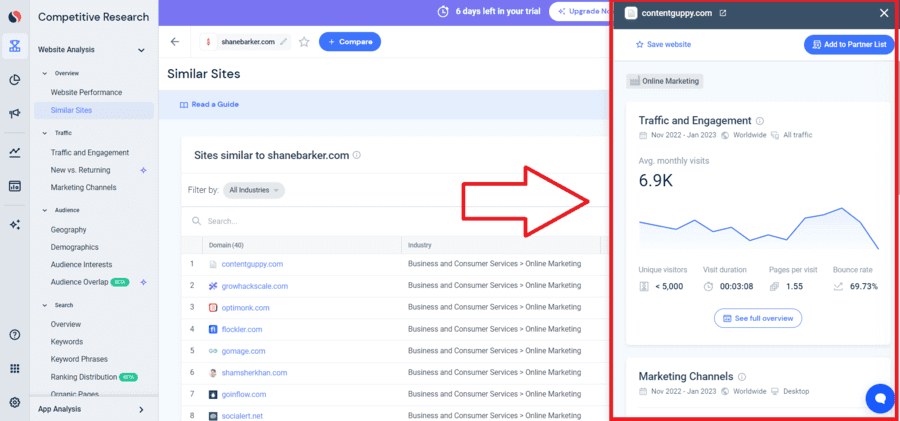
The competition tracker tool, which provides you with rapid insights about your website in comparison to up to 25 competitors, is one really noteworthy product of SimilarWeb. It provides a brief overview of each competitor and a comparison of how well you are doing in a number of categories compared to the targeted competitors. 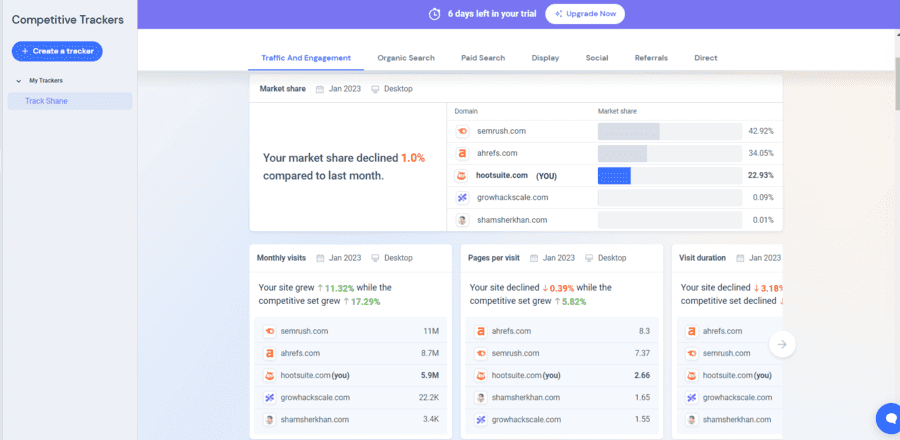
The Keyword Gap Tool from SimilarWeb is comparable to Semrush's and yields findings that are almost identical. In general, SimilarWeb provides a variety of competitive analysis tools that may resemble Semrush. However, in terms of competitor analysis, Semrush is much simpler to use and navigate than another system, which is SimilarWeb. 4. Traffic AnalyzerDetailed traffic information for your website may be obtained with the Semrush Traffic Analytics feature, and you can even evaluate it against the websites of your main rivals. The following noteworthy insights are available in Semrush traffic analytics' various tabs: audience insights, notable sources of traffic, geo-distribution, destination sites and subdomains. 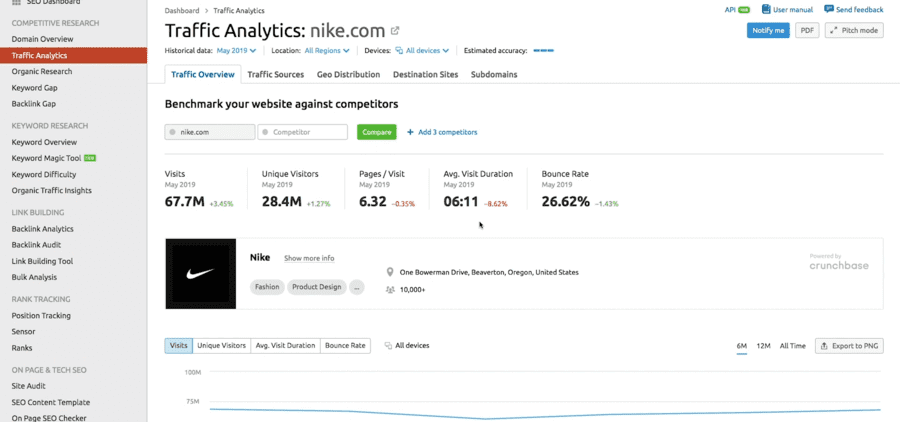
Additional insights include traffic by source and traffic by country. You can further apply filters to these insights using predefined criteria like date and bounce rate. 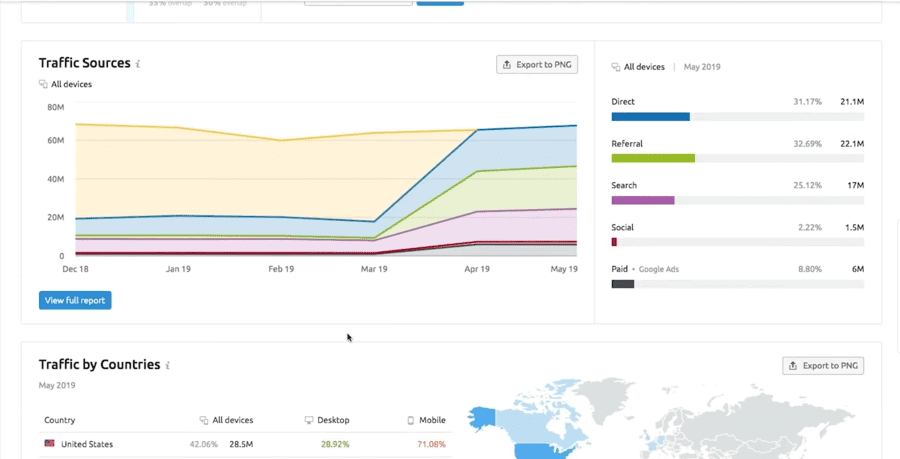
On the other hand, you may see traffic analytics from SimilarWeb underneath traffic and audience. All the details like your site visitors, their origin, demographics and traffic information of your competitors can be seen here. 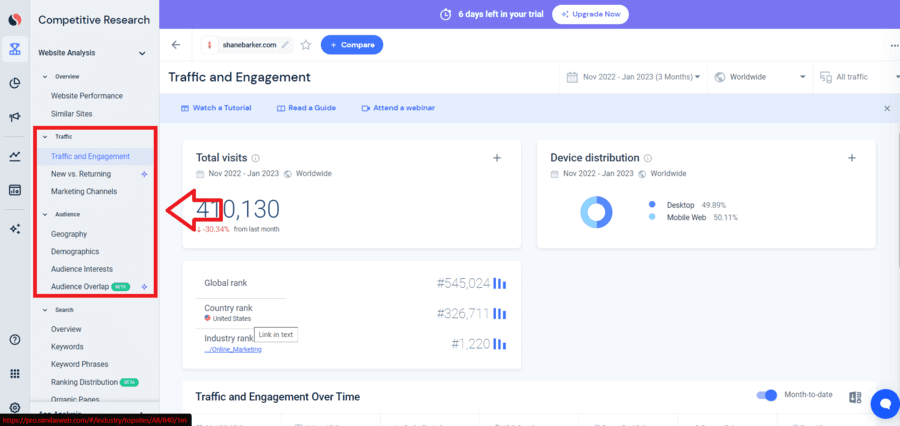
You may obtain some useful information about your audience by going to the "Audience" section. You may look at regional information, demographics like age and gender, and audience preferences there. 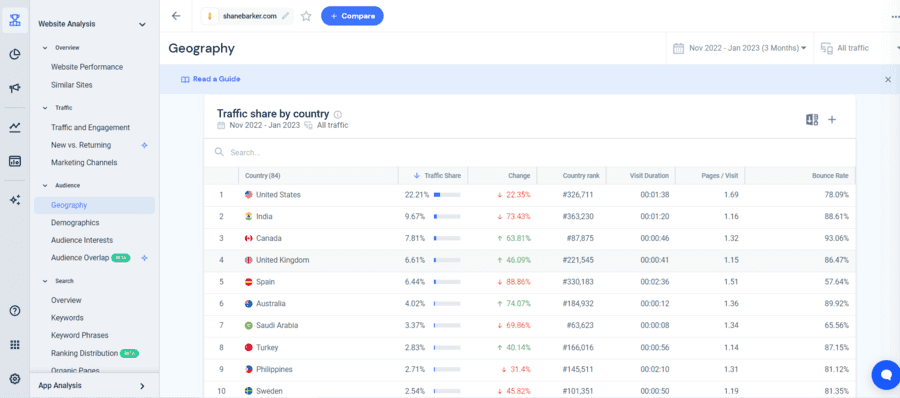
Choosing one between Semrush and SimilarWeb is a difficult decision considering the factor traffic analyzer. It is because they areclosely matched in terms of traffic analytics. Still,SimilarWeb winssince Semrush is unable to match its user-friendly interface and comprehensive analysis oftraffic and audience. It seems appropriate that SimilarWeb's traffic metrics are superior to Semrush's. 5. PricingThere are three levels of pricing for Semrush, such as:
Semrush has three balanced tiers, with the cheapest package being ideal for small enterprises and the business plan being a fantastic choice for big agencies and organizations. For an additional cost, Semrush also provides extra features, such as:
Since SimilarWeb doesn't really offer any specific pricing tiers, figuring out its pricing is a bit more challenging. Its Competitive Intelligence package, which costs $167 per month, is the tool that comes closest to Semrush's offerings. Access to all keyword and traffic tools, site traffic engagement metrics, competition acquisition channels statistics, and ad research tools are all accessible features with this package for $167 per month. Additionally, SimilarWeb also offers a range of additional packages to suit different business types. Some such offerings include:
These offers are not specifically listed with a price anywhere; you need to request a demo and quotation to get a price based on your business requirements. In terms of pricing, Semrush is the overall winner. Even at its most affordable plan, Semrush provides everything you need to increase site traffic and SEO to reasonable levels. Which tool should you choose, SimilarWeb or Semrush?Deciding between Semrush and SimilarWeb can be challenging because both are strong tools in different ways and have pros and cons. You need to choose the appropriate tool between the two, keeping in mind your specific needs. Semrush: When to use it?Semrush is a fairly comprehensive platform that primarily focuses on SEO but also includes tools for content marketing, social media marketing, and even customer relationship management. There is a slight learning curve, but once you get agrasp of it, you won't need anyadditional tools to optimize your website. For this reason, beginners are advised to use Semrush and master its tools. Even Semrush's free edition can provide some insightful data if your company is a small one with limited resources; however, subscribing to the pro version is strongly advised. Furthermore, Semrush's Guru plan is the ideal choice for large enterprises looking for a platform that can provide complete website data, as well as optimization suggestions and other relevant information. SimilarWeb:When to use it?Doing digital Marketing and SEO is a bit different with the SimilarWeb tool. SimilarWeb focuses more on pure data and doesn't give much in the way of SEO optimization. SimilarWeb is quite simple to use and manage compared to Semrush, which requires a bit of learning, especially when it comes to accessing all the options. SimilarWeb also provides in-depth information and insights, but unless you are familiar with SEO and website analytics, you may not know what to do or how to use that data effectively. Because it is detail-oriented and one will easily learn how to use the information provided by SimilarWeb, professionals in the field of digital marketing often recommend using its services.
Next TopicHow to use Semrush
|
 For Videos Join Our Youtube Channel: Join Now
For Videos Join Our Youtube Channel: Join Now
Feedback
- Send your Feedback to [email protected]
Help Others, Please Share









